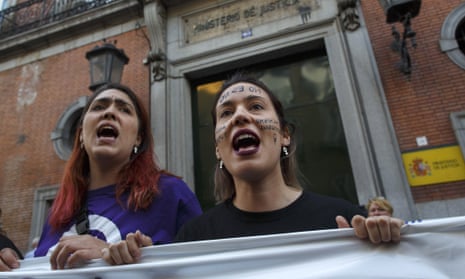As Saxon Mullins bravely told her rape story on Four Corners, Twitter lit up in horror and disbelief. This young woman was shining a light on the issue of consent and how it is interpreted by our judicial system. Her story was powerful and moving, and the next day the NSW attorney general, Mark Speakman, called for public submissions to review consent in sexual assault cases.
Just as the public was incensed by the result in Saxon Mullins’ case, two gang rape trials on the opposite side of the world earlier this year also earned the ire of the public.
Thousands took to the streets of Ireland outraged at the non guilty verdicts handed down to two Ulster rugby players and their friends who were accused of raping a 19-year-old woman at a house party. Similar scenes were echoed across major Spanish cities when five men who dubbed themselves “la manada”, (translating to the pack and later known as “the wolf pack”) were sentenced to nine years in jail for sexual abuse, instead of the more serious charge of rape, after being tried for the attack on an 18-year-old woman at Pamplona’s running of the bulls festival.
The accounts from court transcripts, interviews and media coverage are shocking. Both groups of men bragged about their conquests on WhatsApp groups they belonged to, using derogatory and misogynistic phrases such as “spit roasting” and saying “It was like a merry go round at the carnival”. The women were derided as “loose” and “sluts”. The “wolf pack” filmed and shared video to their WhatsApp group.
So why were there no convictions for rape? Both women, like Saxon Mullins, remained quiet during their ordeals. Neither victim screamed out for help, even when another girl appeared at the door in the Ulster rugby case. Movies and crime shows teach us that women being raped scream and fight against their attackers. Maybe imagining ourselves in similar situations, we also think we would scream and fight to escape. The reality is very different. Northern Ireland medical examiner, Dr Janet Hall, testified that the overwhelming evidence is that most victims of rape don’t fight back.
Sign up to receive the latest Australian opinion pieces every weekday
Writing about the wolf pack case in a blog, Chilean lawyer Daniela Hirsch explained this in the most sober of ways – she said “the girl chose to live. To accept to be raped, to live. Then she closed her eyes, did what she was told and let them do whatever they wanted.”
The victims in all these cases were condemned because they didn’t comply with the patriarchal court system’s archaic views of consent. While some judicial systems seem to understand that “no means no”, they don’t understand that “no” can be conveyed in more than just words. There was terror. There were no smiles or laughter – not from the women anyway. The man who drove the victim home in the Ulster rugby trial sent a text to his friend saying, “Mate no jokes she was in hysterics” and “Wasn’t going to end well.” This was corroborated by a taxi driver. The young woman in Spain was found cowering on a bench, half naked and crying. Saxon Mullins collapsed in the arms of her friend immediately after the attack. How could such strong reactions have resulted from an act of consent?
All of this, along with medical evidence showing internal bruising and bleeding, was able to be ignored because once again these women didn’t fit the “good girl” model that apparently rape victims need to adhere to. One had been drinking and willingly kissed the accused earlier in the night. The woman in the Pamplona case had a photo on her Instagram account, wearing a T-shirt with a popular TV show quote reading, “Whatever you do, make sure you take off your underwear”. Furthermore, a private investigator followed her prior to the trial and photographed her laughing with friends. The judge accepted both as evidence in the case.
Despite all the attacks on their character, these women were extraordinarily brave. One endured almost eight days on the stand being cross-examined by four different defence lawyers. They were painted as whores who willingly engaged in sex acts and then concocted rape stories when they regretted their actions. They had their underwear humiliatingly passed around the courtroom for examination. The court cases were ordeals in themselves, and statistics show that very few women make false rape accusations. Who would willingly put themselves through this if they didn’t have to?
All three women challenged the status quo. With steely resolve, Saxon Mullins articulated what consent is about. “Enthusiastic consent is really easy to determine, and I think if you don’t have that, then you’re not good to go. If it’s not an enthusiastic ‘yes’, it’s a ‘no’. That’s it. And then you’re committing a crime.” Clearly there was no enthusiastic consent in any of these cases. These women didn’t actively participate in sex; they endured it in the interests of self preservation.
Cases like these make it seem like we haven’t progressed very far at all. However, the mass protests in Spain, the Irish Republic and Northern Ireland respectively that followed the verdicts are encouraging. Spurred on by the #metoo movement, the public was making their views known – on the streets and online through hashtags such as “Ibelieveher”. Despite only nine European countries recognising sex without consent as rape, and despite courts around the world persisting with only one accepted model of rape victim (pure, virginal and verbally and physically fighting back), society is making it known that perceived injustices will no longer be tolerated.
As one of the young women testified, “The more I thought about it, rape is a game of power and control. They rely on your silence. The only way you take the power back is when you actually do something about it.”
We need to do something about it. We need to keep shouting – because rape victims can’t do it themselves. We need to keep shouting until judicial systems around the world catch up.









